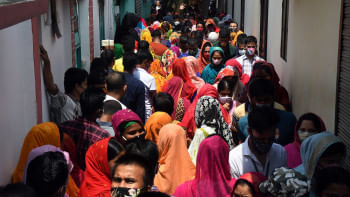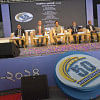Bangladesh's SDG performance: A changed approach can help us get ahead

According to the Sustainable Development Report 2023, Bangladesh has an SDG index of 65.9, ranking 101st out of 166 countries. This is better than India's (63.5) and Pakistan's (59.0), but worse than the indices of Thailand, Vietnam, Indonesia, Malaysia, and Sri Lanka.
Can Bangladesh achieve the UN's Sustainable Development Goals through a business-as-usual process? What is our progress in attaining the 17 SDGs so far? And why is there a need to rethink the ways in which Bangladesh is attempting to attain the SDGs?
The aforementioned report shows that, despite moderate performance in several SDGs, Bangladesh faces major challenges in actually achieving them. These include SDG 1 (No poverty), SDG 2 (Zero hunger), SDG 3 (Good health and wellbeing), SDG 6 (Clean water and sanitation), SDG 7 (Affordable and clean energy), and SDG 9 (Industry, innovation, and infrastructure). Moreover, there seems to be no progress in terms of SDG 5 (Gender equality), SDG 8 (Decent work and economic growth), SDG 11 (Sustainable cities and communities), and SDG 13 (Climate action), indicating significant difficulties in attaining these by 2030. Furthermore, the progress in SDGs 14 to 16 regressed. Only SDG 4 (Quality education) and SDG 12 (Responsible consumption and production) are on track; but even then, there are valid concerns regarding the attainment of universal education, skill development, and ensuring the quality of education in Bangladesh.
Among all SDG targets, only 30.9 percent of targets are on track, 41.2 percent have limited progress, and 27.9 percent are worsening. So, it is clear that the business-as-usual approach will not help Bangladesh to achieve most of the SDGs. Therefore, there is a need to get back to the drawing board with a different mindset.
It should be kept in mind that despite some notable progress on economic and social fronts over the past few decades, Bangladesh is facing its worst macroeconomic challenges in recent times. The ongoing crisis is a result of persistently high inflationary pressure, depleting foreign exchange reserves, low growth in exports and remittances, a growing debt-GDP ratio, and a foreign exchange crisis. Plus, graduating from the LDC status by 2026 will add additional pressure on the economy.
In the rethinking process of attaining SDGs, critical institutional and political challenges need to be addressed. These are related to weak state capacity, ineffective regulation, and weak formal institutions.
The SDGs entail a huge financial gap for Bangladesh. This requires mobilising and leveraging various sources of financing, such as domestic revenue, foreign aid, private sector investment, and public-private partnerships. However, the weak state capacity in the domestic mobilisation of resources is manifested through a very low tax-to-GDP ratio, which has resulted in the growing dependency on external assistance for development projects. In contrast, there is inadequate private sector participation in SDG activities and too few public-private partnerships. Critical reforms in domestic resource mobilisation have remained overdue and thus are imperative.
One obvious impact of Bangladesh's very low tax-to-GDP ratio is that it limits the fiscal space of the country for public spending on social sectors. For instance, Bangladesh spent only 0.5 percent of its GDP on public health and less than two percent on public education in 2020. These figures are below the lower-middle-income countries' averages of 1.5 and 3.9 percent, respectively, and the global averages of 6.9 and 4.5 percent. Moreover, despite the country's strong economic growth, public spending on health and education has not increased significantly in Bangladesh over the years.
Achieving the SDGs would require an effective regulatory environment, which means that a government should have the capacity and authority to design and enforce rules and regulations that serve public interest. However, Bangladesh's ineffective regulatory environment is evident in various aspects of its vulnerable banking system, ineffective tax system, poor monitoring of labour conditions, poor enforcement of environmental regulations, and inadequate laws and administrative organisation. These issues hinder the country's development and sustainability, as they create instability, inefficiency, inequality, and injustice. For example, the vulnerable banking system exposes the country to financial risks and crises; the ineffective tax system reduces fiscal space and resources for public spending and investment; the poor monitoring of labour conditions violates the rights and dignity of workers and affects their productivity and wellbeing; the poor enforcement of environmental regulations leads to pollution and degradation of natural resources; and inadequate laws and administrative organisation give way to loopholes and obstacles towards the implementation and coordination of SDGs.
Multiple actors and sectors, both at the national and sub-national levels, must come together to help achieve these goals. This means that achieving the SDGs demands a whole-of-government and whole-of-society approach, requiring a strong coordination mechanism to ensure coherence, alignment, and accountability in terms of SDG implementation. All actors and sectors involved need to follow a common vision, strategy, and plan, and report on their progress and performance. However, such a mechanism rarely functions well in Bangladesh and thus results in the lack of a clear institutional framework for overseeing and monitoring SDG achievement progress. To combat this, the country needs to strengthen its coordination mechanism.
Bangladesh's weak institutional capacity, bureaucratic inefficiency, and corruption undermine the quality and delivery of public services and policies. These issues similarly hamper the implementation and monitoring of actions meant to help attain the SDGs, as well as the accountability and transparency of the public institutions and officials. They also erode the faith of the people and of the partners in the government's commitment and ability to achieve the SDGs. Therefore, undertaking critical institutional reforms is essential to make a significant departure from the business-as-usual process.
Dr Selim Raihan is professor at the Department of Economics in University of Dhaka, and executive director at the South Asian Network on Economic Modeling (Sanem). He can be reached at [email protected]
Views expressed in this article are the author's own.
Follow The Daily Star Opinion on Facebook for the latest opinions, commentaries and analyses by experts and professionals. To contribute your article or letter to The Daily Star Opinion, see our guidelines for submission.

 For all latest news, follow The Daily Star's Google News channel.
For all latest news, follow The Daily Star's Google News channel. 











Comments